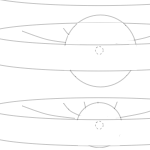Biases for neutron-star mass, radius and distance measurements
 Our paper on the unusually low "touchdown" fluxes for radius-expansion bursts from high-inclination sources was just accepted by MNRAS. Usually the touchdown flux is thought to equal the Eddington flux, but we found that in sources that show X-ray dips — likely arising from structure at the edge of the accretion disk passing across the line of sight, implying that we see these systems almost edge-on — the touchdown flux could be less than half the maximum flux seen earlier in the same burst. The low touchdown fluxes also likely arise from interactions with the disk material, which have some implications for neutron-star distance (but not mass and radius) determination following the method of Özel (2006)
Our paper on the unusually low "touchdown" fluxes for radius-expansion bursts from high-inclination sources was just accepted by MNRAS. Usually the touchdown flux is thought to equal the Eddington flux, but we found that in sources that show X-ray dips — likely arising from structure at the edge of the accretion disk passing across the line of sight, implying that we see these systems almost edge-on — the touchdown flux could be less than half the maximum flux seen earlier in the same burst. The low touchdown fluxes also likely arise from interactions with the disk material, which have some implications for neutron-star distance (but not mass and radius) determination following the method of Özel (2006)
Read the paper (arxiv.org:0712.0412)
Labels: 2008, /neutron star EOS




